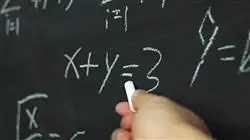University certificate
The world's largest faculty of education”
Why study at TECH?
The best program on the current academic market to learn about Pedagogical Innovation in Mathematics and update your practice"

The educational revolution that has taken place in recent years, supported by technological development, has enabled the design of new pedagogical strategies based on increasingly dynamic and effective techniques and tools, allowing teachers to develop participatory and entertaining classes to enhance cognitive processes through collaborative learning and the use of ICT. This type of academic approach contemplates the inclusion of games as the basis for teaching, as well as the use of methods such as Bloom's Taxonomy to hierarchize the processes of knowledge acquisition and ensure the achievement of academic objectives through the development of skills such as comprehension, critical thinking, analysis or memorization.
In view of this, TECH has developed a comprehensive program that brings together the latest and most exhaustive information related to this field in a convenient and flexible 100% online format, allowing teachers to update their practice based on the latest and most effective educational trends. This Postgraduate diploma in Pedagogical Innovation in Mathematics, is a 600-hour academic experience, through which teachers can explore the implementation of gamification in classes and the use of ICT to capture students' attention. In addition, they will work intensively on the different mathematics learning landscapes, with special emphasis on the teaching methodologies that are currently yielding the best results, one example being the Flipped Classroom.
Thus, in only 6 months of multidisciplinary training, teachers will be able to enhance their professional skills, contributing to a significant improvement in learning based on innovation and the most effective pedagogical strategies. In addition to the syllabus, they will have dozens of hours of supplementary material of the highest quality, presented in different formats and available from the first day on the Virtual Campus. This will allow them to contextualize the information and delve deeper into the aspects they consider most important. It is, therefore, a unique opportunity to raise classes to the highest level, through an academic experience that will revolutionize mathematics teaching.
This Postgraduate diploma will help you to incorporate the most innovative and sophisticated gamification techniques in classes, so that you can teach in an entertaining way"
This Postgraduate diploma in Pedagogical Innovation in Mathematics contains the most complete and up-to-date program on the market. The most important features include:
- The examination of practical cases presented by experts in Mathematics teaching
- Graphic, schematic and practical contents which provide technical and practical information on those disciplines that are essential for professional practice
- Practical exercises where self-assessment can be carried out to improve learning
- A special emphasis on innovative methodologies
- Theoretical lessons, questions to the expert, debate forums on controversial topics, and individual reflection assignments
- Content that is accessible from any fixed or portable device with an Internet connection
Would you like to include ICT in your classes, but don't know where to start? This Postgraduate diploma will enable you to do so effectively and in only 6 months of 100% online professional development"
The teaching staff includes professionals from the sector who contribute their experience to this educational program, as well as renowned specialists from leading societies and prestigious universities.
The multimedia content, developed with the latest educational technology, will provide professionals with situated and contextual learning, i.e., a simulated environment that will provide immersive education designed to prepare them for real situations.
This program is designed around Problem-Based Learning, whereby the professional must try to solve the different professional practice situations that arise during the academic year. For this purpose, the student will be assisted by an innovative interactive video system created by renowned and experienced experts.
You will be able to explore Bloom's taxonomy applicable to Mathematics, allowing you to hierarchize cognitive processes at different levels and facilitate assessment"

Do you want to master the Flipped Classroom methodology to develop complex experiential activities in your classes? Thanks to this Postgraduate diploma, you will be able to do so successfully"
Syllabus
The quality and prestige that define TECH and place it as one of the best digital universities worldwide has been the result of years of effort and struggle to shape the best 100% online degrees. In each of them, there is a team versed in the field, which is responsible for selecting not only the theoretical information that makes up the syllabus, but also use cases based on real situations and hours of high-quality supplementary material. Thanks to this, it is possible to offer highly empowering academic experiences condensed in a convenient and flexible format that facilitates student learning from any place, without schedules and through any device with an Internet connection.

The flexibility of the Virtual Campus and its optimization for any device will allow you to access it from wherever you want and through your mobile, tablet or PC"
Module 1. Learning Mathematics in Secondary School
1.1. Defining Learning
1.1.1. The Role of Learning
1.1.2. Types of Learning
1.2. Learning Mathematics
1.2.1. Differential Learning of Mathematics
1.2.2. Features of Mathematics
1.3. Cognitive and Metacognitive Processes in Mathematics
1.3.1. Cognitive Processes in Mathematics
1.3.2. Metacognitive Processes in Mathematics
1.4. Attention and Mathematics
1.4.1. Focused Attention and Mathematics Learning
1.4.2. Sustained Attention and Mathematics Learning
1.5. Memory and Mathematics
1.5.1. Short-Term Memory and Mathematics Learning
1.5.2. Long-Term Memory and Mathematics Learning
1.6. Language and Mathematics
1.6.1. Language Development and Mathematics
1.6.2. Mathematical Language
1.7. Intelligence and Mathematics
1.7.1. Development of Intelligence and Mathematics
1.7.2. Relationship between High Abilities, Giftedness with Mathematics
1.8. Neural Bases of Mathematics Learning
1.8.1. Neural Foundations of Mathematics
1.8.2. Adjacent Neural Processes of Mathematics
1.9. Characteristics of Secondary School Students
1.9.1. Adolescent Emotional Development
1.9.2. Emotional Intelligence Applied to Adolescents
1.10. Adolescence and Mathematics
1.10.1. Adolescent Mathematical Development
1.10.2. Adolescent Mathematical Thinking
Module 2. Gamification in Mathematics
2.1. Play
2.1.1. Play
2.1.2. Play Since the Middle Ages
2.2. Games in Childhood
2.2.1. Areas Developed by Games
2.3. Games in Adolescence
2.3.1. Introduction
2.3.1.1. Elements which make Games so Important for Adolescents
2.3.1.2. Adolescents and Video Games
2.3.1.3. Better Hand-Eye Coordination
2.3.1.4. Faster Thinking, Sharper Memory
2.3.1.5. Greater Creativity
2.3.1.6. Promote Learning
2.3.2. The Video Game as an Educational Tool
2.3.2.1. When to Act When is Video Gaming Detrimental?
2.4. Gamification
2.4.1. Motivation and “Continuous Feedback”
2.4.1.1. Personalized Education
2.4.2. Societal Change
2.4.3. Elements of Gamification
2.5. Gamification of Mathematics
2.5.1. Representation of all Types of Functions
2.5.2. Solving 1st and 2nd Degree Equations
2.5.3. Solving Systems of Equations
2.6. Application of Gamification in Mathematics (Part I)
2.6.1. How Gamification Works
2.6.2. Gamification Model
2.6.3. Purpose of Gamification
2.6.4. Padlocks
2.6.5. Analysis of Gamification Elements
2.7. Application of Gamification in Mathematics (Part II)
2.7.1. Introduction to Augmented Reality
2.7.2. Creating Auras
2.7.3. Mobile Configuration
Module 3. The Mathematics Learning Landscape
3.1. What are Learning Landscapes Applied to Mathematics?
3.1.1. The Horizontal Axis of the Learning Landscape Matrix: Bloom’s Taxonomy
3.1.2. The Vertical Axis of the Learning Landscape Matrix: Multiple Intelligences
3.1.3. The Learning Landscape Matrix
3.1.4. Supplements to the Learning Landscape
3.1.5. Example of a Learning Landscape
3.2. Bloom’s Taxonomy applied to Mathematics
3.2.1. Bloom’s Taxonomy of Thinking Skills (1956) and Mathematics
3.2.2. Review of Bloom’s Taxonomy (Anderson and Krathwohl, 2001) and Mathematics
3.2.3. Bloom’s Taxonomy for the Digital Age (Churches, 2008) and Mathematics
3.3. Multiple Intelligences applied to Mathematics
3.3.1. Linguistic Intelligence applied to Mathematics
3.3.2. Logical-Mathematical Intelligence applied to Mathematics
3.3.3. Spatial Intelligence applied to Mathematics
3.3.4. Musical Intelligence applied to Mathematics
3.3.5. Body and Kinesthetic Intelligence applied to Mathematics
3.3.6. Intrapersonal Intelligence applied to Mathematics
3.3.7. Interpersonal Intelligence applied to Mathematics
3.3.8. Natural Intelligence applied to Mathematics
3.3.9. Existential Intelligence applied to Mathematics
3.4. Designing a Learning Landscape in Mathematics
3.4.1. Context of the Curricular Content to be Worked On
3.4.2. Gamification
3.4.2.1. Game Elements
3.4.2.2. Narrative
3.4.3. Design of Activities
3.4.3.1. Bloom Double-Entry Intelligences Matrix
3.4.3.2. Determination of Itineraries
3.4.3.3. Designing Activities for Each Itinerary
3.4.3.4. Assessment
3.4.3.5. Design of the Genially Graphical Environment
3.5. Example of a Learning Landscape Applied to Mathematics
3.5.1. Context of the Curricular Content to be Worked On
3.5.2. Gamification
3.5.2.1. Narrative
3.5.2.2. Game Elements
3.5.3. Design of Activities
3.5.3.1. Bloom Double-Entry Intelligences Matrix
3.5.3.2. Designing Activities for Each Itinerary
3.5.3.3. Assessment
3.5.3.4. Design of the Graphical Environment -Final Result
Module 4. Other Innovative Methodologies in Mathematics
4.1. Flipped Classroom applied to Mathematics
4.1.1. The Traditional Class
4.1.2. What Is the Flipped Classroom?
4.1.3. Advantages of the Flipped Classroom applied to Mathematics
4.1.4. Disadvantages of the Flipped Classroom applied to Mathematics
4.1.5. Example of a Flipped Classroom applied to Mathematics
4.2. Peer Mentoring in Mathematics
4.2.1. Definition of Mentoring
4.2.2. What is Peer Mentoring?
4.2.3. Advantages of Peer Mentoring in Mathematics
4.2.4. Disadvantages of Peer Mentoring in Mathematics
4.2.5. Example of Peer Mentoring Applied to Mathematics
4.3. Conceptual Jigsaw Puzzles applied to Mathematics
4.3.1. Definition of Jigsaw Puzzles
4.3.2. What is a Conceptual Jigsaw Puzzle?
4.3.3. Advantages of Conceptual Jigsaw Puzzles in Mathematics
4.3.4. Disadvantages of Conceptual Jigsaw Puzzles in Mathematics
4.3.5. Example of Conceptual Jigsaw Puzzle Applied to Mathematics
4.4. Digital Murals applied to Mathematics
4.4.1. Definition of a Mural
4.4.2. Digital Murals in Mathematics
4.4.3. Tools for Making Digital Murals in Mathematics
4.4.4. Advantages of Digital Murals in Mathematics
4.4.5. Disadvantages of Digital Murals in Mathematics
4.4.6. An Example of a Digital Mural applied to Mathematics

If you want to revolutionize teaching and become a leading mathematics teacher, opt for this Postgraduate Diploma and start working towards excellence in the projects you propose"
Postgraduate Diploma in Pedagogical Innovation in Mathematics
Discover a new way to teach and learn mathematics with this Postgraduate Diploma program in Pedagogical Innovation in Mathematics from TECH Global University. In an increasingly digital and connected world, it is essential to adapt our teaching methodologies to provide quality and engaging education. Our postgraduate program is designed for those who are passionate about mathematics and want to make a difference in the educational field. With our online classes, you can access the content from anywhere and at any time that fits your schedule. Forget about travel and time constraints. Make the most of your learning with our interactive platform and innovative digital resources. Our digital university is internationally recognized for its academic excellence and in the field of educational technology. In this program you will be supported by highly trained professionals and experts in mathematics and pedagogy, who will guide you through every step of your advanced education.
Innovate in the way mathematics is taught around the world.
Focusing on the content of the program, you will be immersed in the most cutting-edge methods for teaching mathematics, fostering critical thinking, problem solving and creativity. You will learn how to use state-of-the-art technological tools, such as interactive applications and specialized software, to make your classes dynamic and engaging. In addition, you will learn innovative pedagogical strategies that will allow you to adapt the curriculum to the individual needs of your students and promote their active participation in the learning process. You will learn how to design effective assessments and use didactic resources that stimulate interest and understanding of mathematics. Don't miss the opportunity to stand out as an innovative educator in the field of mathematics. Become a reference in the teaching of this discipline and contribute to the development of STEM skills in new generations.







